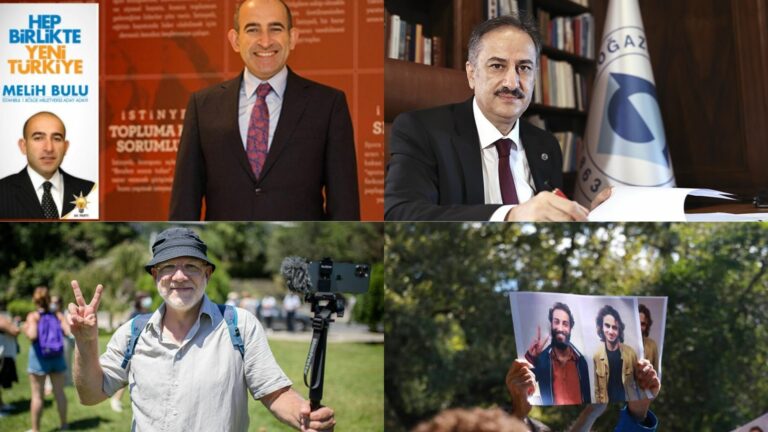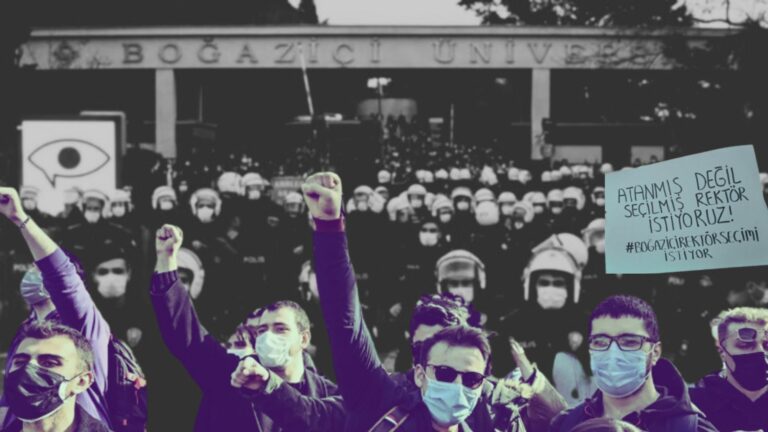Translated by Leo Kendrick
Graduates of Boğaziçi University have reported plagiarism allegations directed at Boğaziçi University rector Melih Bulu to Turkey’s Council of Higher Education (YÖK). Just a day after he was reported, President REcep Tayyip Erdoğan dismissed him from his position. Bulu went as he came: by overnight decrees.
Melih Bulu’s appointment to Boğaziçi University rectorship by a midnight presidential decree on 1 January led to student and faculty protests lasting more than six months. Accusations of plagiariasm came as soon as he was appointed. Finally, these reports of plagiarism were sent to Turkey’s Council of Higher Education.

“The plagiarism was not a simple mistake, it was systematic”
Boğaziçi University’s Graduate Initiative (BUİM) said in a statement: “Graduates compared parts of Bulu’s master’s and doctoral theses with original texts and found misuse of quotation marks and improper referencing, and saw that plagiarism in both theses was not simply the result of a few accidental errors, but was rather systematic plagiarism given the volume of misleading references. It was announced that the plagiarism investigation reports were submitted to YÖK within the framework of Higher Education Law No. 2547 and that graduates had requested a detailed investigation from the Ethics Investigation and Investigation Commission.”
Reports of Melih Bulu’s alleged plagiarism in Masters and Doctoral Theses came to light shortly after his appointment to the Boğaziçi rectorship. Bulu, who acknowledged that he had not used quotation marks for quotes in his theses, characterized the allegations as “slander” and gave the following response:
“Although it is a small technical detail, I provided a literature section in my doctoral thesis. Everything there is quoted from other sources. At the end, the sources are listed. I did not bother with the quotation marks. We had no such format. Formats change constantly. The heart of the matter is whether your sources are listed, right? Well we listed them in the end.”
“Paragraphs were copy-pasted”
A Boğaziçi University graduate, academic, and member of the team filing the plagiarism report spoke to Medyascope and alleged that the level of plagiarism in Bulu’s theses is worse than he indicated. The Boğaziçi academic, who shared that 40-45 graduates have joined the complaint against Bulu submitted to YÖK, described the “quotation mark” debate as follows:
“In his doctoral thesis, Bulu used a format known as APA. If you choose not to include direct quotes within quotation marks, you must instead ‘paraphrase’ in which you express the original author’s ideas using different wording. If quotation marks are not used, then these borrowed ideas must be followed by the author’s name, the date, and page number, but this was not done. This method is referred to as “bkz.” in Turkish. We noticed that there was no paraphrasing, and that paragraphs were instead directly copy-and-pasted. When you use this approach, you must use quotation marks. He copied the texts from various places, one after the other, without citing the original author’s references; not a single sentence is his own. Because he copied from different places, there is also no linguistic integrity.”
Medyascope'un haftalık e-bülteni
Andaç'a abone olun
Editörlerimizin derlediği öngörüler, analizler, Türkiye’yi ve dünyayı şekillendiren haberler, Medyascope’un e-bülteni Andaç‘la her çarşamba mail kutunuzda.
The graduate who spoke to Medyascope said that on 131 pages, 70 instances of plagiarism were encountered and documented. Under normal circumstances, YÖK is expected to give a response within 30 days. If no response is received, this graduate indicated that YÖK will be reminded of the outstanding complaint against Bulu.

“In the best-case scenario, it just slipped through the cracks”
When asked how a plagiarized thesis could have been approved by Boğaziçi University’s thesis committee, the faculty member we spoke with expressed that at the time of Bulu’s Masters and Doctoral theses in 1998 and 2003, the university lacked the modern electronic means capable of detecting plagiarized work.
“In the best-case scenario, it just slipped through the cracks,” said this Boğaziçi alumnus, who continued saying: “Seeing as how we are Boğaziçi graduates, we express everything transparently, and everything is based on self-inquiry. Therefore if there is such a mistake, Boğaziçi will say “we made a mistake’. It will not harm the institution.
The same academic also said that Bulu frequently changed formats and ignored commas, and assessed Bulu’s statement as follows: “This explanation is not correct at all. At Boğaziçi University in the first year, schoolwork writing instructions are given. More than one citation format is used and information related to these formats is given to students. At the institutes, format-related books are given to students prior to thesis writing.”
Melih Bulu’s doctoral thesis cannot be downloaded from YÖK’s website. It may be accessed through Boğaziçi University Library’s information system.
Original article:














